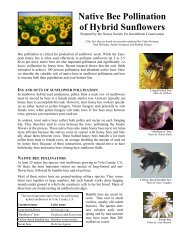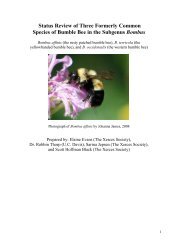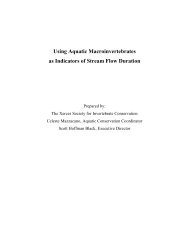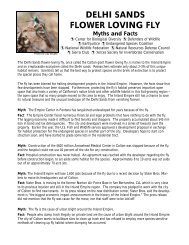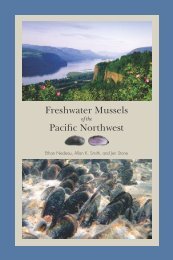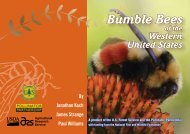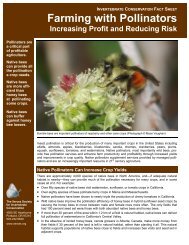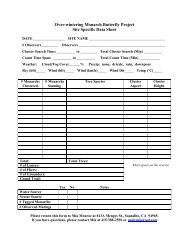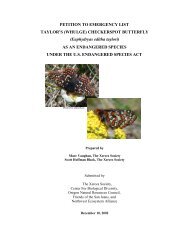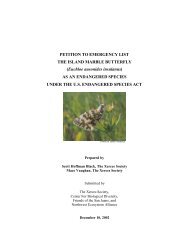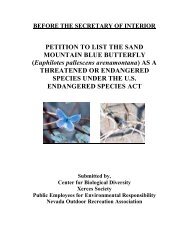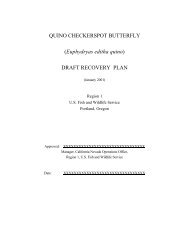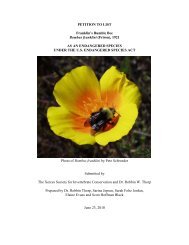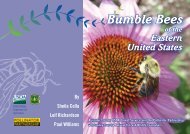Freshwater Mussels Pacific Northwest - The Xerces Society
Freshwater Mussels Pacific Northwest - The Xerces Society
Freshwater Mussels Pacific Northwest - The Xerces Society
Create successful ePaper yourself
Turn your PDF publications into a flip-book with our unique Google optimized e-Paper software.
34<br />
rents 105 . Banks and pools are often favorable habitats because the currents are<br />
weaker, shear stress is lower, and the substrates are more stable 51,92 . M. falcata<br />
does not tolerate sedimentation. In Idaho’s Salmon River, M. falcata covered<br />
with a substantial amount of sand and gravel were unable to move to the surface<br />
and perished 105 . In environments where host fish are abundant, physical<br />
habitat is ideal, and human threats are minimal, M. falcata can attain very<br />
high densities (>300 per square yard), often carpeting the stream bottom. In<br />
1981, Clarke wrote, “In favourable localities in British Columbia the mussels<br />
may be so abundant and closely packed that they completely obscure the<br />
stream bottom.” 18<br />
Conservation<br />
Recent conservation concerns about M. falcata closely mirror well-known<br />
stories of the decline of <strong>Pacific</strong> salmon fisheries. Both need clean cold streams<br />
and rivers, and M. falcata reproduction requires salmon and trout hosts. <strong>The</strong><br />
greatest threats to western pearlshells come from loss of host fish species and<br />
water diversion projects for irrigation, power generation, and water supply,<br />
particularly in Washington, Oregon, Idaho, and California. Dams destroy<br />
many miles of free-flowing rivers, disrupt native fish communities, and may<br />
have contributed to the demise of many populations of western pearlshells.<br />
Agriculture and rapid urbanization are affecting aquatic ecosystems throughout<br />
the West through nutrient enrichment, siltation, and chemical pollution,<br />
all of which may negatively impact western pearlshells. Climate change<br />
has been implicated in the decline of the closely related M. Margaritifera in<br />
North America and Europe 40 and it is likely that M. falcata will be affected<br />
in similar ways.<br />
Invasive species that compete with native fish may affect M. falcata.<br />
In some locations where western pearlshells are still abundant, native cutthroat<br />
trout are being replaced by nonnative rainbow, brown, and brook<br />
trout 27,28,48,81 . <strong>The</strong> long-term effects of increasing nonnative fish populations<br />
on native mussels, albeit with fish species that may also serve as hosts, are<br />
illustration: Ethan Nedeau<br />
<strong>The</strong> cutthroat trout is an important host species for Margaritifera falcata<br />
<strong>Freshwater</strong> <strong>Mussels</strong> of the <strong>Pacific</strong> <strong>Northwest</strong>



